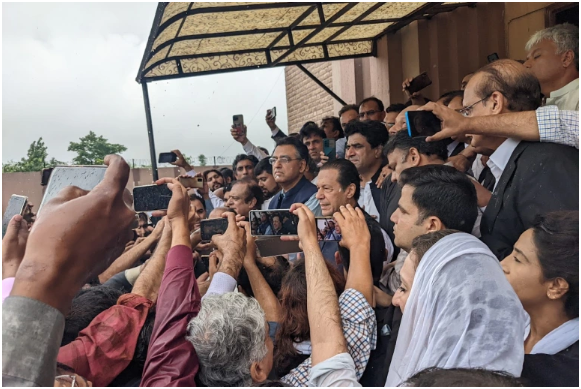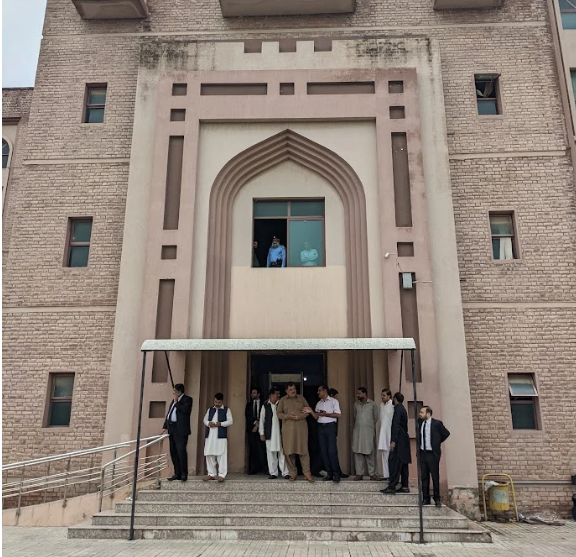Islamabad, Pakistan – An anti-terrorism court in Islamabad has granted interim bail to Imran Khan, the Pakistan Tehreek-e-Insaf (PTI) chief and former prime minister, in a case registered against him last week for his remarks against senior police officials and a female judge.
The judge, Raja Jawad Abbas, on Thursday granted Khan bail until September 1 against a surety of 100,000 Pakistani rupees ($460).
Later in the day, additional sessions judge Tahir Abbas Supra also granted Khan interim bail until September 7 over an unlawful assembly charge against a surety of 5,000 Pakistani rupees ($22.8).

A hearing over a contempt of court charge will take place on August 31.
The cricketing icon-turned-politician has faced mounting legal challenges over the last few days. The last week saw multiple cases filed against him, including one under anti-terrorism laws for “threatening” senior police officials and a female judge, as well as contempt of court and unlawful assembly.
Before Khan arrived in court on Thursday, his lawyer contended that the terrorism case against the PTI chief was registered by police as an “act of revenge”.
Strict security was in place around the judicial complex where the hearing took place, with law enforcement officials deployed outside the courts.
The hearing
On a rainy Thursday, Khan arrived at the court just before midday, where he was surrounded by senior PTI leaders and party supporters.

In a packed courtroom, Khan’s lawyer Babar Awan said that the three individuals Khan was accused of threatening had not filed charges.
Awan, while repeating Khan’s statements from the rally, questioned how Khan’s comment of “‘have some shame’, which is often used colloquially, is considered threatening”.
After a short hearing, the court granted interim bail, while also issuing notices to the prosecutor and the PTI’s lawyers for their replies, and adjourned proceedings.
After the hearing, Khan spoke to reporters and criticised the state’s actions against him, saying efforts to sideline him have made the country a “joke”.
“Pakistan is ridiculed around the world. Shahbaz Gill is tortured and when I say that I will take legal action against those police officials who are responsible, who sent him back to police despite torture, just because of saying that, I get booked under an anti-terrorism case,” he said.
“The news was covered around the world and looks as if Pakistan is a banana republic where no rule of law exists.”
He added that “those who are doing this, and those behind this, they should think of the country”.
“We are holding the biggest rallies in Pakistan’s history. Just because of that fear, they want to save themselves and trying to technically knock me out.”
After his government was toppled in April, Khan has repeatedly held large rallies, during which he has heavily criticised his political opponents, state institutions, the security forces and “neutrals”, a commonly used euphemism for Pakistan’s military establishment.
The case against Khan
The police report against Khan includes testimony from Magistrate Ali Javed, who said he heard Khan criticise the inspector-general of Pakistan’s police and another judge at an Islamabad rally on Saturday.
Under Pakistan’s legal system, police file what is known as a First Information Report (FIR) detailing charges against an accused person to a magistrate, who gives the green light for the investigation to go ahead. Police then arrest and question the accused.
The magistrate argued in his FIR that Khan’s speech had spread fear and uncertainty among police, judges and the nation.
“Terrorism has been spread, the country’s peace has been harmed,” he said.
Barrister Haider Rasul Mirza, a Lahore-based criminal law expert, told Al Jazeera that Khan’s appearance at the court had meant he was granted interim bail.
“Imran Khan has given court his version via his lawyers that he fears an imminent threat of arrest since he believes the case is based on malafide [wrong] intention. Thus, after his protective bail, the court has now given him protection for interim period and will issue notice to prosecution to present their arguments,” Mirza said.
He added that while Khan can be given an exemption from the next hearing if his lawyers file an appeal on his behalf, it cannot be a “permanent exemption”.







